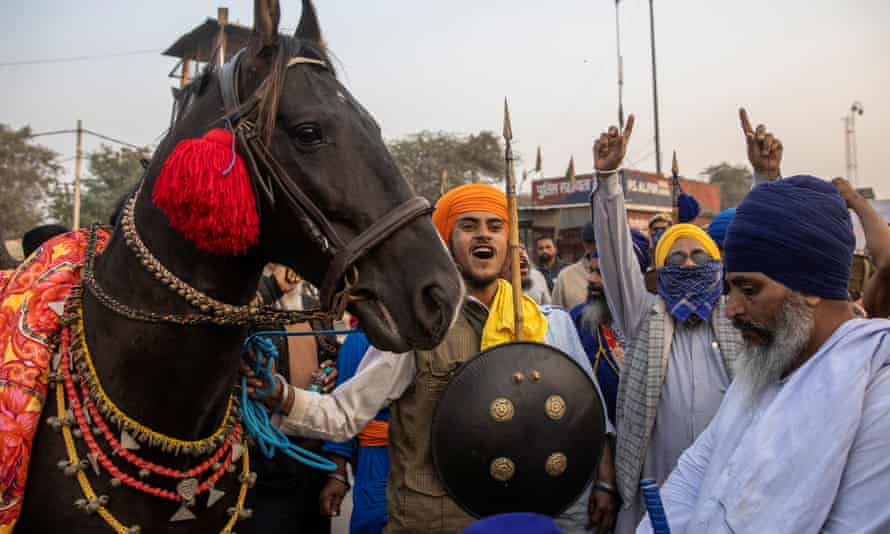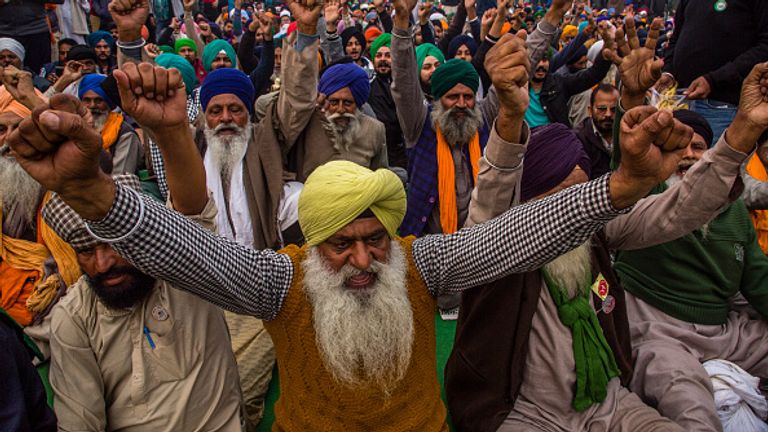It’s been over two weeks since farmers from the Indian states of Punjab and Haryana started to travel down to the capital city, Delhi. Manasa Narayanan spoke to people involved in this push-back against India’s new Agriculture Bills and the centralised government imposing them.
The ‘Delhi Chalo’ (Let’s go to Delhi) march is a display of opposition by the farmers to the three Agriculture Bills that were passed in the lower and upper house of the Indian parliament in September. These bills, having been sanctioned by the president, have become Acts now.
The major concern of the farmers is that these laws would leave them vulnerable to private, commercial players. While the government portrays the bills as liberalising farmers for their own benefit, farmers do not see it that way. They see the Acts as a step towards long-term corrosion of farmers’ rights and safeties.
police were using force to clear the space, even grabbing people by their hair and dragging them, he tells me.
The movement gained momentum and attracted media attention in the last week of November when farmers reached the capital city. The march was impeded initially by the police force using barricades, batons, tear gas and water cannons. Eventually, they were allowed in. Many farmers managed to make it to Delhi while several have been camping and demonstrating from the various entry points to the city. Numerous other groups of people, farmers and non-farmers, have joined the movement, protesting and showing solidarity from different parts of the country. Right now, the movement is in full swing and the government, in talks with the farm union leaders, is being forced to re-examine its top-down approach towards policies.
Over the phone, I spoke to Mr Talim, a lawyer from Haryana, who has been a supporter of the farmers’ movement for some years now. On 1st December, along with several others, he was arrested on his way to Delhi. He was part of a group of people from Mewat (a region in Haryana state) who were going to join the farmers. They were stopped and arrested by the local police in a town called Sohna in Gurugram district, located only a couple of hours from Delhi.
Their group was travelling in a car, peacefully, without raising any slogans, he explains – pointing to the illegitimacy of the charges
Also part of this group was Mr Salamuddin, who is the current president of the Mewat Vikas Sabha (an NGO that has been working in the area for more than two decades on various social causes). He told me how several of their attempts to join the demonstrations were impeded. Local officials and police arrived at his house on 26th November to prevent him from joining the march when it first started. Then, on 1st December, when they managed to reach Sohna, the police arrested them. The charges levied against them were Section 151, which is “Knowingly joining or continuing in assembly of five or more persons after it has been commanded to disperse”, and Section 160, “Punishment for committing affray”. Affray is a term used to describe an instance where peace is disturbed in a public place. Their group was travelling in a car, peacefully, without raising any slogans he explains – pointing to the illegitimacy of the charges which seem to be tools being used to throttle dissent.

On 8th December, the day of the Bharat Bandh, when farmers called for a country-wide strike, he and several others attempted a sit-in demonstration on a highway. During this demonstration, police were using force to clear the space, even grabbing people by their hair and dragging them, he tells me. Despite this, they still plan to keep up their efforts and support the movement.
These protests and marches by the farmers are not sudden occurrences. Even before the rally in Delhi, protests had been taking place locally in Punjab for some months. The concerns stretch even far back. Both Mr Talim and Mr Salamuddin had joined farmers from their state in previous visits to the capital in 2018 and 2019. At the time, their demands were restricted to getting an assurance from the government regarding the preservation of the Minimum Support Price (MSP) in their states.
The government-sympathetic media is reporting this as a frenzy caused by misinformation that is being fuelled by leftist intellectuals.
Set by the government, MSP is the minimum price at which farmers can sell a particular commodity. The setting of this price ensures that farmers at least get paid that amount for their produce.
But this time around, the demands have moved beyond the MSP – they are much more and much more extensive. Even when the government has offered to give written assurance of the maintenance of MSP, the farmers have not budged from their demands; which is that the Indian government repeal all the three Farm Bills that were passed this year.
The government-sympathetic media is reporting this as a frenzy caused by misinformation that is being fuelled by leftist intellectuals. They say the laws have nothing to do with the MSP and that the farmers are deluded.
In fairness, the criticism levied by the farmers goes beyond MSP and is majorly to do with fears of commercial exploitation in the long-run (which is conveniently being ignored in the reportage of this section of the media). The more liberal (left-leaning) media is framing the issue as a fight against government injustices.
Amid all this divided reporting, what is not to be forgotten is the utter disregard for people and their needs in policy-making. This is very much an instance of a government imposing policies in a top-down manner without taking into account what the needs and sentiments of the farmers are.
There is indeed confusion over what these laws mean and what their long-term implications would be. There is a gap between the understandings of those in power and the demands of the people on the receiving end of these policies. That is the main problem.
Indeed, the spirits of these farmers have not reduced at all even after so many cold nights in Delhi’s streets.

In 1996, journalist P. Sainath, published a book called “Everybody Loves A Good Drought”. Written after extensive travel and on-the-ground research in rural areas, the book pointed out the gaps in top-down policy-making. Sainath makes for important reading in times like this. He has always been vocal about various development issues and has spoken out in support of this protest too.
Fearlessly, he says of the government in power: “They believed that if you could smash through these laws at this time [during the pandemic], all these guys, the farmers, the workers will be in no position to organise and resist. It was really a bad miscalculation”. Indeed, the spirits of these farmers have not reduced at all even after so many cold nights in Delhi’s streets.
In 2020 (24 years since Sainath’s book was first published), lessons have still not been learnt. People whose lives would be affected by the policies are still not consulted before they are imposed. As the levels of discontent across the country shows, the solutions to the country’s problems, rural or otherwise, do not lie in increased centralisation nor privatisation. Discontent arises when a decision at the centre dictates the fate of the vast expanse people and land in India. When, without consideration, the fate of the many are determined by the rich few. Privatising agriculture is an issue that touches many a nerve within the farming sector, as these protests demonstrate.
If anything, this protest is a waking call for us to abandon the top-down and de-centralise policy making. As I see it, this movement is a bottom-up pushback to the top-down impositions of the centre.
Header image credit: Sky News

